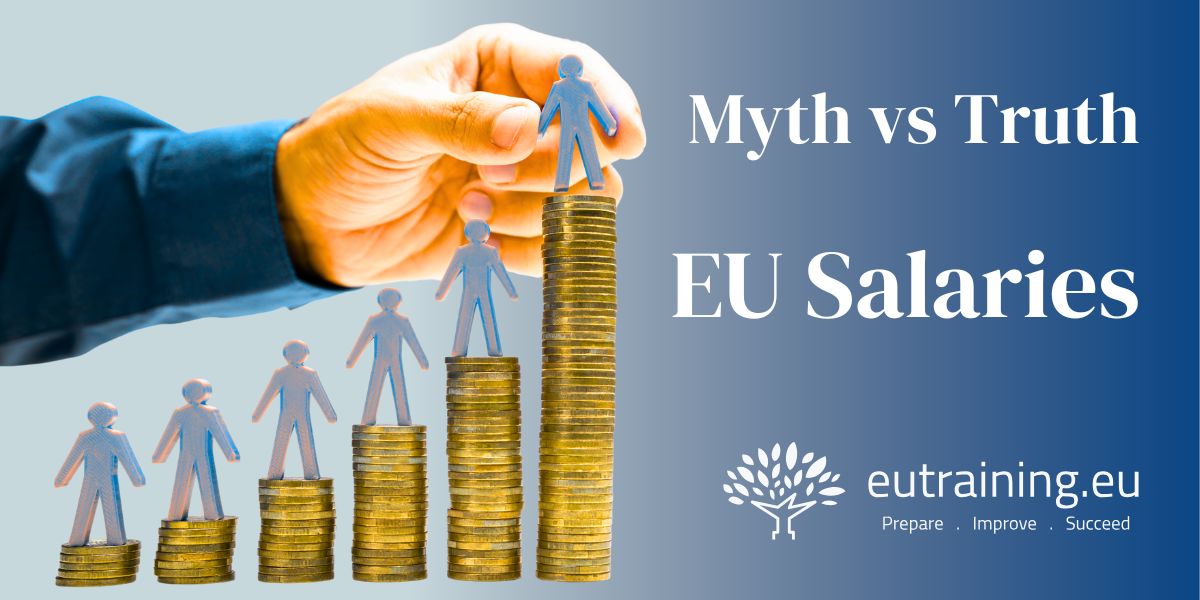
EU Salaries: Myth vs Truth
| MYTH | TRUTH |
| “EU jobs are tax-free.” | EU staff pay internal taxes—progressive rates apply. |
| “Only top officials earn well.” | Entry-level roles like AD5 already start above €5k/month gross. |
| “Benefits are only for senior posts.” | Health, education, allowances, and insurance apply to most staff. |
| “Pensions kick in early and are huge.” | Pension accrues over long career; age of 63–66 and capped at ~70% salary. |
Yes, EU officials pay tax
There’s a common misconception that EU staff don’t pay income tax. That’s not true. Some EU officials actually see over 50% of their salary deducted, just like in many national civil services.
They don’t pay national income tax, but do pay a set of internal EU deductions:
- A progressive Community tax (from 8% to 45%),
- A solidarity levy of 6% or 7%, and
- Social contributions to pension and healthcare, some exceeding 50% of gross salary.
And they earn well anyway
Here are current 2025 estimates for gross monthly salaries across typical EU grades:
- Assistant (AST3): €3,700–€4,000
- Administrator (AD5): €5,300–€5,800
- Mid‑level Administrator AD 6–9: €6,300–€9,900
- Senior Officials AD 10–15 €10,000–€16,000+
Even after deductions, that leaves most EU staff with a strong net salary, especially when you factor in perks and career progression.
Benefits beyond the paycheck
EU positions come with a substantial benefits package - especially valuable for expatriates or families:
Health insurance (JSIS): Covers around 80% of medical costs for staff and eligible dependents, with costs shared through employee contributions (~2%).
Education support: Expatriate staff are eligible for European Schools, which are top multilingual institutions designed primarily for children of EU staff. Accredited EU schools across member states also serve this function and receive Commission funding.
Allowances for families, including:
- A household allowance (~191 € + 2% of salary)
- A dependent child allowance (≈ 418 €/child/month)
- Education allowance for school fees when not enrolled in a European School, up to defined ceilings.
Expatriation allowance: Typically 16% of basic salary (also includes child/household allowances) for staff relocating outside their home zone (€567+ minimum)
Council of Europe Ministers.
Pensions: Officials build up 1.9% per year of service, up to a maximum of 70% of final basic salary after around 35 years, with eligibility after 10 years or reaching age 63/66. Employees contribute ~9.25% monthly .
Other perks may include generous annual leave, parental leave, home‑leave travel contributions, and language allowances under EU Staff Regulations.
Check the facts for yourself: All benefits are outlined in the EU Staff Regulations, and apply to staff across institutions like the Commission, Parliament, and Council.
EU careers advantages
Yes, EU salaries are taxed - but significantly and transparently, through the EU system, not national ones.
Yes, you pay social contributions - but so do top-level officials and it funds excellent health, pension, and family support.
Yes, EU careers still offer competitive net income, plus job security, international exposure, and purposeful impact.
A career with the EU might involve some deductions - but it delivers far more than it takes away.
- Try out the Salary Calculator
References:
- European Commission. (2016). Consolidated version of the Treaty on the Functioning of the European Union – Protocol (No 7) on the Privileges and Immunities of the European Union. EUR-Lex
- EU Careers. (2025). Salary and benefits. European Personnel Selection Office (EPSO)
- EU Careers. (2025). Family life and allowances. European Personnel Selection Office (EPSO)
- European University Institute. (n.d.). Benefits
- The Parliament Magazine. (2023). Who is the highest-paid EU official?
- Wikipedia contributors. (2025). Office for administration and payment of individual entitlements. Wikipedia.
- European Schools. (2025). The European Schools system
- European Court of Auditors. (n.d.). Staff allowances overview.